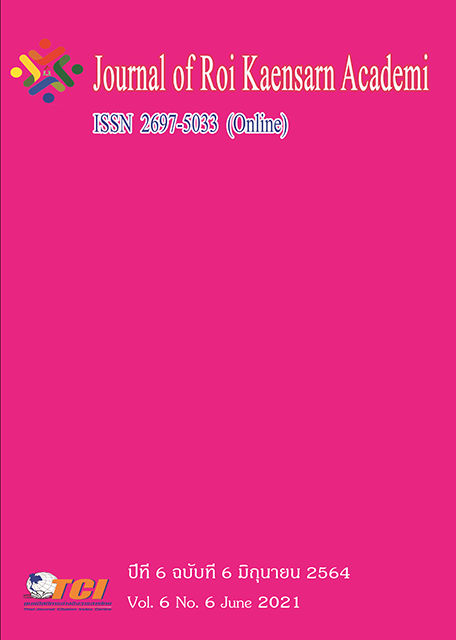บุคลิกภาพแบบหวั่นไหวสัมพันธ์กับความเครียดของโปรแกรมเมอร์ ในช่วงแพร่ระบาดของโรคไวรัสโคโรนา 2019
Main Article Content
บทคัดย่อ
การวิจัยนี้มีวัตถุประสงค์เพื่อศึกษาระดับความเครียดของโปรแกรมเมอร์ในช่วงแพร่ระบาดของโรคไวรัสโคโรนา 2019 และศึกษาความสัมพันธ์ระหว่างบุคลิกภาพห้าองค์ประกอบที่มีผลต่อความเครียดของโปรแกรมเมอร์ในช่วง COVID-19 แพร่ระบาด กลุ่มตัวอย่างเป็นผู้ปฏิบัติหน้าที่ในการเขียนโปรแกรม จำนวน 250 คน เครื่องมือที่ใช้เก็บรวบรวมข้อมูลได้แก่ แบบสอบถามข้อมูลส่วนบุคคล แบบวัดความเครียด SPST-20 และแบบวัดบุคลิกภาพ International Nationality Item Pool – NEO ฉบับภาษาไทย วิเคราะห์ข้อมูลด้วยสถิติเชิงพรรณา ได้แก่ ความถี่ ร้อยละ ค่าเฉลี่ย และสถิติสำหรับวิเคราะห์โมเดลสมการโครงสร้างแบบ MIMIC Model
ผลการวิจัยพบว่า 1) โปรแกรมเมอร์ที่ทำงานในช่วง COVID-19 ส่วนใหญ่มีความเครียดอยู่ในระดับสูงถึงรุนแรง 2) โมเดลสมการโครงสร้างความสัมพันธ์ระหว่างบุคลิกภาพห้าองค์ประกอบที่มีผลต่อความเครียดในการทำงานของโปรแกรมเมอร์ในช่วง COVID-19 มีความสอดคล้องกับข้อมูลเชิงประจักษ์ โดยตรวจสอบค่าไค-สแควร์ (Chi-Square) เท่ากับ 8.041 ที่องศาอิสระ (df) เท่ากับ 8 ค่า p เท่ากับ 0.429 ดัชนี GFI เท่ากับ 0.992 AGFI เท่ากับ 0.964 RMSEA เท่ากับ 0.005 RMR=0.008 SRMR เท่ากับ 0.015 ตัวแปรทั้งหมดสามารถอธิบายความแปรปรวนของความเครียดได้ร้อยละ 43 โดยบุคลิกภาพแบบหวั่นไหวมีความสัมพันธ์เชิงบวกกับความเครียดของโปรแกรมเมอร์ในช่วง COVID-19 แพร่ระบาด อย่างมีนัยสำคัญทางสถิติ มีอิทธิพลทางตรงต่อความเครียดเท่ากับ 0.654 ผลการวิจัยสามารถใช้เป็นข้อมูลสำหรับหน่วยงานในการส่งเสริมและพัฒนาสุขภาพจิตสำหรับผู้ที่ปฏิบัติหน้าที่เป็นโปรแกรมเมอร์เพื่อให้เกิดประสิทธิภาพในการทำงาน
Article Details
เอกสารอ้างอิง
กรมสุขภาพจิต กระทรวงสาธารณสุข. (2561). คู่มือคลายเครียดฉบับปรับปรุง. (พิมพ์ครั้งที่ 2). กรุงเทพมหานคร: กรมสุขภาพจิต.
กุลชนา ช่วยหนู. (2552). โมเดลเชิงสาเหตุของการปฎิบัติงานแบบกลุ่ม : อิทธิพลของบุคลิกภาพห้าองค์ประกอบ ส่งผ่านความรู้เกี่ยวกับการทำงานแบบกลุ่ม บุคลิกลักษณะผัดวันประกันพรุ่ง และปฏิสัมพันธ์. วิทยานิพนธ์ศิลปศาสตรมหาบัณฑิต. สาขาวิชาจิตวิทยาอุตสาหกรรมและองค์การ. คณะจิตวิทยา. บัณฑิตวิทยาลัย: จุฬาลงกรณ์มหาวิทยาลัย.
ทิพย์วิมล จรลี. (2558). บุคลิกภาพห้าองค์ประกอบ ความสามารถในการเผชิญและฟันฝ่าอุปสรรคและการรับรู้พฤติกรรมการเป็นสมาชิกที่ดีขององค์การ ของพนักงานกลุ่มบริษัทผลิตไฟฟ้าขนาดเล็กแห่งหนึ่ง. วิทยานิพนธ์ศิลปศาสตรมหาบัณฑิต. คณะศิลปะศาสตร์. บัณฑิตวิทยาลัย: มหาวิทยาลัยธรรมศาสตร์.
พูลพงศ์ สุขสว่าง. (2563). โมเดลสมการโครงสร้าง (Structural equation modeling). (พิมพ์ครั้งที่ 3). ชลบุรี: เอ.พี.บลูปริ้นท์.
วันทนา เนาว์วัน และ อารมณ์ เอี่ยมประเสริฐ. (2563). การจัดการความเครียดและปัจจัยที่เกี่ยวข้องกับการจัดการคุณภาพชีวิตในการทำงาน. วารสารวิทยาการจัดการปริทัศน์. 22 (1), 223-232.
วิจิตร แผ่นทอง และคณะ. (2562). โมเดลความสัมพันธ์เชิงสาเหตุของปัจจัยที่มีอิทธิพลต่อภาวะซึมเศร้า : MIMIC Model. วารสารการพยาบาลและการศึกษา. 12 (2). 52-67.
Charalampous, M., Grant, C. A., Tramontano, C., & Michailidis, E. (2018). Systematically reviewing remote e-workers’ well- being at work: a multidimensional approach. European Journal of Work and Organizational Psychology. doi:10.1080/1359432X. 2018.1541886
Costa Jr, P. T., & McCrae, R. R. (1992). The five-factor model of personality and its relevance to personality disorders. Journal of personality disorders. 6(4), 343-359.
Hair, J. F., Black, W. C., Babin, B. J., & Anderson, R. E. (2019). Multivariate data analysis. (8 ed.). United Kingdom: Cengage.
Kevin M. et al, (2020). COVID-19 and the Workplace: Implications, Issues, and Insights for Future Research and Action. American Psychologist. 19 (1), 63-77.
Lim, Y. J. (2015). Relations between virtues and positive mental health in a Korean population: A Multiple Indicators Multiple Causes (MIMIC) model approach. International Journal of Psychology. 50 (4), 272-278.
Pollak, A., Dobrowolska, M., Timofiejczuk, A., & Paliga, M. (2020). The Effects of the Big Five Personality Traits on Stress among Robot Programming Students. Sustainability, 12(5196).
Ralph, P., et al. (2020). Pandemic programming How COVID-19 affects software developers and how their organizations can help. Empirical Software Engineering.
Simões, N. C., & Hauck Filho, N. (2018). Testing the validity of a psychopathy index calculated from THE Big Five Inventory. Temas em Psicologia. 26 (3), 1335-1347.
Yomaboot, P., & Cooper, A. J. (2016). Factor structure and psychometric properties of the International Personality Item Pool-NEO (IPIP-NEO) Thai version. Journal of Somdet Chaopraya Institute of Psychiatry. 10 (2).

